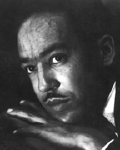| What fascinated me the most about Langston Hughes was his genuine love of the black people. He was outstanding because of his ability to get past the stigmas left by racism and see the beauty of the African-American culture. Because of this, he probably didn't have a hard time writing poems and stories illustrating the true merit of the race - he saw reasons for merit everywhere. This was especially true in Harlem. The "dreaming city" provided endless inspiration for his beautiful poems about blacks of all kinds. | ||
 Langston Hughes
Langston Hughes
|
It's remarkable that Hughes' father, a lawyer, was actually prejudiced against the race, a state of mind so completely unlike his son's. Apparently, racism is not passed on genetically, and Langston probably resented his father's decidedly unfounded hate against his people and himself. While living with his grandmother, he was told many stories about courageous African-Americans, something which probably heightened his admiration for them. I would be interested to find out if he went to school with mainly whites, which would help explain why he was lonely there. | |
| Another impressive thing about Hughes is his unselfishness in all areas. He was constantly in need of money, never making wealth an aim. Also, it was never a goal of his to be famous; his genius was only discovered when he accidentally left a poem on the table after dining with an influential man. And after fame arrived, he insisted on continuing to write for "the masses:" everyone in his race. This is quite unlike W.E.B. DuBois and Jessie Fauset, who really wrote for an elite, educated group and believed that the common people couldn't do much to help the situation. Also unlike these people, Hughes for the most part didn't like politics. After obtaining more international views and becoming more involved in politics, he said that it haunted the rest of his career. Despite this, he was constantly writing, and constantly receiving awards for his work. | ||
 Zora Neale Hurston
Zora Neale Hurston
|
Zora Neale Hurston was like Hughes in many ways. Although she grew up in an all-black town, she also had conflicts with her father and didn't have great experiences in school. However, she loved books and writing, and like Hughes continued to do it at all costs - she divorced twice primarily to be able to keep on writing! She, too, was poor pretty much all her life. And most importantly, her writing was like Hughes' in that she captured the culture and spirit of the masses - blacks who hadn't been satisfactorily recorded before and by all means should be, since they made up the majority of the race! Her quest for documentation of them stemmed from studying anthropology, but she must have also admired her people if she chose them as the one topic to pursue. Finally, Hurston and Hughes were also good friends for a long time, until they got into a disagreement over authorship of a jointly-written play - quite ironic considering the usual magnanimity of the two. | |
| The importance of Hurston's writing, and also the way in which it differed from other styles, was that it showed the worthiness of blacks not by comparing them to whites, but by celebrating their differences. Their culture and values were different from whites', but beautiful nonetheless. Considering the fact that Hurston published more than any other African-American woman, and was so popular during her early life, it's amazing that her work was virtually lost for so long. It's very fortunate that Alice Walker put in the effort to "re-discover" Hurston's work and help make it well-known once again. | ||
| It's worth mentioning that Jacob Lawrence, a painter, shared the previously mentioned authors' tendency to portray simple subjects like relaxing and going to night clubs. He, however, more closely resembled Booker T. Washington than either of the other two in his focus on the dignity of labor. Whereas Hughes simply expressed the lives of black folk, Lawrence painted scenes relating more specifically to Washington's ideas about the importance of struggle and the beauty of efficient work, especially involving tools. | ||
| What these artists contributed to the Harlem Renaissance was a sort of innate confidence that it was okay to be black, and a feeling that equality would come eventually because it was deserved. More than anyone else, Hughes really personifies the entire Harlem Renaissance - his genuine admiration of blacks (and his writing skills) characterize the whole movement. The dreamy quality of his writing gave African-Americans of the period something to hope for, something to look forward to. It's no wonder that Hughes is generally the first person that comes to mind when someone mentions the Harlem Renaissance. | ||
€ An Elite Group of African-Americans
€ A New Way to Treat Racism
€ Admiring the Differences
€ Unsung Heroes of Black America
€ A Lot of Creative, Inspiring People